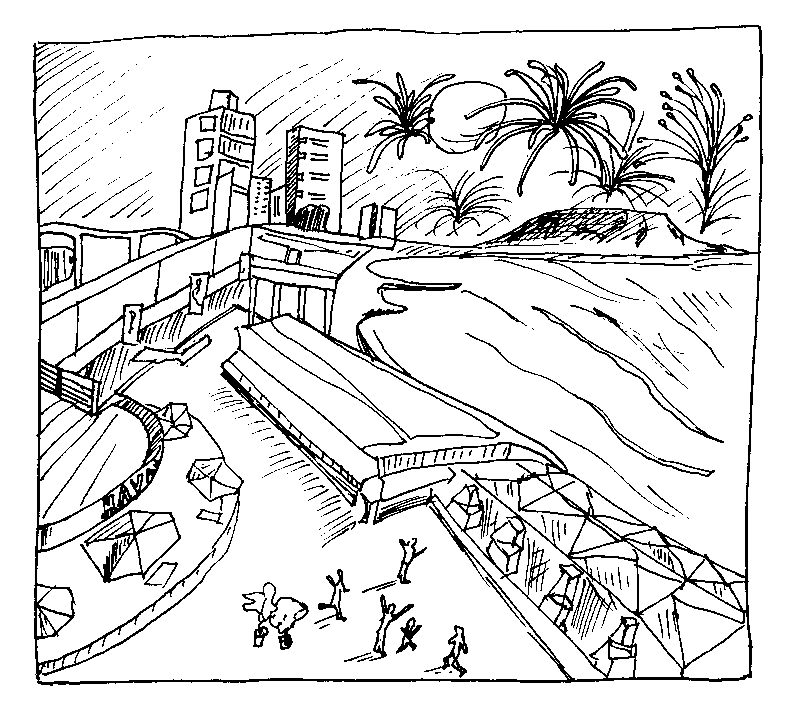My first love, fútbol
October 16, 2020
I had never witnessed a more beautiful scene in my life. The red and white shades colored every shop and restaurant around me. The coastal night sky boomed with fireworks as the moonlight shone on the pristine waters of Larcomar, a shopping centre in the district of Miraflores, Peru. The televisions around me displayed images of the parades all across my beautiful country as proud Peruvians everywhere prepared for Peru’s debut at the 2018 World Cup.
At a ceviche restaurant on June 5, the eve of the biggest sports game of my life, a childhood dream of mine came true; my nation would see their national fútbol team play at the FIFA World Cup for the first time since 1970. Across Latin America, from Buenos Aires to Rio de Janeiro to Mexico City, the dreams and hopes of over a billion people would rest at the kick of a ball. At the World Cup, the greatest sports spectacle in the world, Latin America would witness the most important matches of the sport that symbolizes not just a game, but a way of life and culture which becomes ingrained in the heart at birth.
For many people in Latin America, a greater honor does not exist than to wear your country’s jersey on the pitch at a World Cup. Latin America itself has a rich footballing history which has produced many legends of the game such as Pele, Diego Maradona, Ronaldo Nazario, and arguably the greatest footballer to ever play the “beautiful game,” Lionel Messi. (For those of you wondering, YES, Messi is a more complete and better footballer than Cristiano Ronaldo, but that is a topic for another day).
The World Cup itself was born in South America, with Uruguay defeating Argentina 4-2 in the final to claim victory at the inaugural World Cup, which took place in Uruguay in 1930. Since then, South American countries have won eight more World Cups and produced many more teams which have dazzled and enamored fans across the world. In South America, however, the task of qualifying for the World Cup is a four-year odyssey unlike any other in the world.
The ten nations (Argentina, Bolivia, Brazil, Chile, Colombia, Ecuador, Paraguay, Peru, Uruguay and Venezuela) that comprise the South American Football Association, CONMEBOL, compete in a round-robin home and away competition where only four countries can directly qualify and one additional must go into an intercontinental playoff. This arduous journey can bring the warriors who undertake it from the tropical air of the Maracanã in Brazil to the blistering Barranquilla sun of “El Metro” in Colombia to even as far up as the dreaded heights of Estadio Hernando Siles in La Paz, Bolivia (11,932 feet above sea level in altitude—yikes). On October 8, Peru and Paraguay kicked off the World Cup 2022 qualifiers, a new chapter which will no doubt bring the same passion, musical fanaticism, tears, anguish, joy and unrivaled emotions as the last one.
I have, unfortunately, often received criticism for my fútbol fanaticism from the “soccer hater” brigade, individuals who often reek of cheap beer, borderline-racist elitism and fragile masculinity. Such examples include: “But Carlos! How can you watch such a boring sport where 22 dudes just kick around a ball?”, “Dude, it is just a goal, how can you be THIS excited?”, “All these sissies do is dive and complain, go watch a real sport!” If the sport is not for you, then that is completely understandable, but if you constantly hate on the sport to flex your superiority complex, then your ignorance masquerading as arrogance cannot be helped. You truly do not get it.
Fútbol is part of my culture, my identity and, most importantly, my life. I have played and watched the game since I was a child; it has created some of the most joyful and heartbreaking memories of my life. I cannot accurately describe the sheer emotion of watching my team score a goal, or even the one of receiving the jersey of one of my favorite players. The way this sport unites and inspires the world amazes me, and the World Cup serves as the greatest example of this. The mass appeal of the sport goes beyond the pitch, where historic rivalries such as Barcelona versus Real Madrid, Manchester United versus Liverpool, and Italy versus France form part of a much larger story boiled down into a 90-minute competition. The plight of the United States women’s team, for example, serves as an example of a larger fight against sexism and inequity. To my reader, I sincerely encourage you to watch and keep up with the fútbol world because it will widen your horizons more than you can expect. In a college where we are constantly challenged to seek the “common good” and be “intellectually fearless,” we would be remiss not to pay attention to the most influential sport in the world.
Comments
Before submitting a comment, please review our comment policy. Some key points from the policy:
- No hate speech, profanity, disrespectful or threatening comments.
- No personal attacks on reporters.
- Comments must be under 200 words.
- You are strongly encouraged to use a real name or identifier ("Class of '92").
- Any comments made with an email address that does not belong to you will get removed.



“…individuals who often reek of cheap beer, borderline-racist elitism and fragile masculinity.”
Dude, soccer is my favorite sport. But this clumsy jab is nonsensical and ironic.
First, what is “racist” about a person preferring football (where pros are mostly African-American), basketball (ditto), or baseball (increasingly Latino)? And your strawman stereotype doesn’t even make sense — what is “elitist” about cheap beer and body odor?
But, more importantly, if you think soccer fandom is relatively free of toxic masculinity and ignorance, reconcile that with the soccer fans in Central and South American countries, including Peru, who collectively yell “puto” at games. Explain the monkey chants at black players in Italy, Portugal, England, Spain, Brazil, Peru, and so on. S.S. Lazio ultras idolize fascists like Mussolini. Fans in Zenit St. Petersburg’s largest supporters’ group publicly demand their club not sign black or gay players. Did you know that two weeks ago, right here in America, a USL game was abandoned because a Jamaican player used an anti-gay slur against an openly gay opponent?
Soccer players and soccer fans are not more ideologically pure than members of other sporting cultures. To truly believe otherwise is, I think, elitist.
Unfortunately, I think you missed the point.
First off, the people who that jab was at were the “soccer hater” brigade. For more context, here is a bleacher report article explaining more clearly the people I am jabbing at, you can even google “soccer hater” and find more.
https://bleacherreport.com/articles/944275-the-11-most-mind-numbingly-ridiculous-reasons-to-hate-soccer
Secondly, there is nothing racist about preferring other sports! I clearly state this when I say “If the sport is not for you, then that is completely understandable”.
Thirdly, I never state anything about fútbol being free of racism, sexism, or ignorance. The article was about why i LOVE futbol (with the obvious Latin American twist), and if i can write a paragraph poking fun at the sport’s haters, then I can write books making fun of the the supporters, FIFA as an organization, and the players (look up Luis Suarez to start, the rabbithole is endless). Like with any other sport, major (and I mean MAJOR) problems exist in the fútbol world too, and the examples (all which I knew of) that you mention are valid, but attempting to list the problems with the sport is inappropriately misinterpreting and decentering the theme of the column.
Replying to Carlos:
First, what is “inappropriate” misinterpretation? Do you genuinely think my criticism is in bad faith?
Second, you characterized certain critics of soccer as being “racist,” even though your examples have nothing to do with racism. That point, which I did not miss, is meritless. Using the label of “racism” as a cudgel against anyone with whom you disagree, or to cast yourself as morally superior to and/or victimized by your opponent, is a shameless fallacy used too often by intellectually dishonest folks doing the “discourse.” The emptiness of your label is telling: look at how you reframe your position on this issue, writing that “soccer haters” are racist and elitist and whatever else, and now saying that you were just “poking fun” at them. That Bleacher Report article (which suggests that people hate soccer because of “scarves,” which sounds totally legit) is not very enlightening about this alleged “brigade,” but also, even BR has the restraint not to claim that some “soccer haters” are racist simply because they find the game boring, low scoring, or marred by player simulation. You lacked that same restraint. But I’m glad that you appear to be backing off that claim now.
I tried to keep this article as lighthearted as possible, so let me further explain. Poking fun at some “soccer haters” as “borderline-racist” came as a result from some of my experiences having been seeing my favorite sport criticized as “un-American”. An example of a phrase actually said to me includes “here in America, we do not care about that *awful term describing immigrants* sport”. Around 2010 during the South Africa WC, I even heard about the comments from a talkshow named the G. Gordon Liddy Show, where a man (Dan Gainor) is quoted in saying that soccer is being sold due to the “browning of America”.
This label I gave to some of the haters does not have emptiness. But again, criticism of the sport’s haters was NOT the point of the article. Furthermore, there is nothing racist (or even remotely wrong) about DISLIKING or critiquing futbol because personal preference is a valid reason to dislike it. However, some of the vitriol thrown by people who actively HATE the sport has, in my experience, had a racial undertone. So, yes, your interpretation was inappropriate. However, we probably have had different experiences so I thank you for engaging.